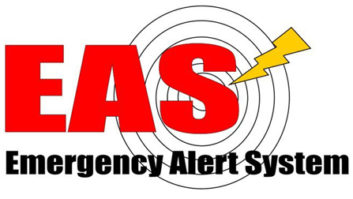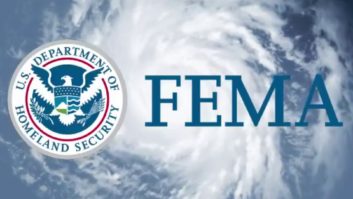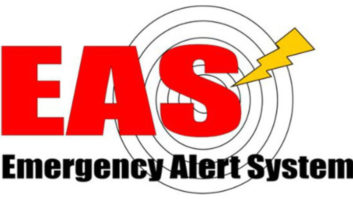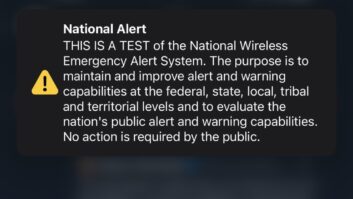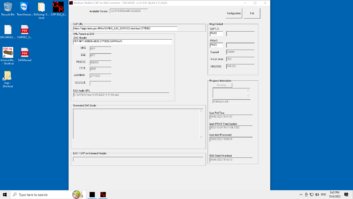National EAS Test and CAP Compliance Extension
Oct 6, 2011 2:01 PM, by Lee Petro
With one month left to go before the National EAS Test, the FCC and FEMA are in full-court press mode to get the word out and get broadcasters in position to make the test run as smoothly as possible. In addition, the Commission recently took the immediate pressure off broadcasters to implement the Common Alert Protocol (CAP).
First, FEMA and the FCC are holding a series of events in advance of Oct. 3, 2011, when they will release the final version of the Best Practices Guide for the National EAS Test. The first-ever initiation of a national EAS test will be held on Nov. 9, 2011, for three minutes. Subsequent to the test, the Commission is requiring all participants to submit a report by Dec. 24, 2011, which must include the following information:
� Whether they received the alert message during the designated test;
� Whether they retransmitted the alert;
� If they were not able to receive and/or transmit the alert, their “best effort” diagnostic analysis regarding the cause(s) for such failure;
� A description of station identification and level of designation (PEP, LP-1, etc.);
� The date and time of:
� Receipt of the EAN message by all stations;
� PEP station acknowledgement of receipt of the EAN message to FEMA;
� Initiation of actual broadcast of the Presidential message;
� Receipt of the EAT message by all stations; and
� Who they were monitoring at the time of the test, and the make and model number of the EAS equipment they utilized.
The Commission will not use the information against any participant in an enforcement action or other proceeding, but will be analyzing the information to determine the necessary steps to improve the process. At this point, the reports must be submitted on paper, but an electronic version of the report may be ready for use by the deadline.
Next, the Commission had set a Sept. 30, 2011, deadline for the installation of equipment that was capable of receiving and interpreting CAP-related messages. The standards had been adopted by FEMA in 2007, and the Commission previously granted two extensions of the deadline. However, the Commission released a Notice of Proposed Rulemaking that sought comment on a bevy of EAS-related questions. One matter raised was whether the Commission would require the certification of CAP-enabled devices before they could be marketed and sold. Thus it became clear that the Commission could not let the Sept. 30, 2011, EAS CAP deadline remain when its own procedures had yet to be adopted, let alone provide broadcasters sufficient time for implementation.
Therefore, with two weeks to spare, the Commission extended the deadline until June 30, 2012, a time by which the Commission believes it will have concluded the pending rulemaking, adopted certifications standards, if any, and provided sufficient time for the devices to be manufactured, tested, sold and installed. The Commission also issued a warning to those broadcasters that had purchased “intermediary devices” (think DTV converter boxes for EAS) that such devices had not yet been approved by the Commission, and that these devices may not satisfy the final standards adopted by the Commission. In other words, don’t toss the receipt yet.
It is clear that the FCC and FEMA are serious about testing EAS and upgrading the country’s emergency messaging capabilities. It is likely that the end result from the National EAS Test and the completion of the pending rulemaking proceeding will lead to a substantial overhaul of the current EAS program, especially in light of the ability for new technologies to rapidly disseminate information. All broadcasters should review the Best Practices manual after it is released and take reasonable steps to prepare for the National EAS Test.
Dateline

October 16: Radio stations in Florida, Puerto Rico and Virgin Islands continue running License Renewal Post-Filing Announcements, continuing on Nov. 1 and Nov. 16.
October 16: Radio stations in Georgia and Alabama continue running License Renewal Pre-Filing Announcements on Oct. 16, Nov. 1, and Nov. 16.
December 1: Radio stations in Georgia and Alabama file License Renewal Application and EEO Program Report. Noncommercial radio stations also file their Biennial Ownership Report (FCC 323-E). Begin running License Renewal Post-Filing Announcements.
December 1: Commercial radio and television stations, including LPTV and Class A television stations, file Biennial Ownership Report (FCC Form 323).
Petro is a member of Fletcher, Heald & Hildreth, PLC, Arlington, VA. Email: [email protected].
October 2011
Streaming to mobile devices, a tour of the new CJWV, insight into IBOC mask compliance, the Radio magazine annual salary survey, Field Reports on the Blue Mics Yeti Pro and Harris Intraplex HD Link and more….





